Exploring Epistemology: Theories of Knowledge - Philosophy 3MO512
VerifiedAdded on 2023/04/25
|9
|1932
|189
Essay
AI Summary
This essay provides a comprehensive overview of epistemology, delving into the theories of knowledge as presented by key philosophers such as Descartes, Locke, Berkeley, Hume, and Kant. It addresses fundamental concepts like the 'train of experience,' the logical gap, and the logical bridge, while critically examining Descartes' method of systematic doubt and his reliance on God to bridge the gap between mental and non-mental events. The essay also discusses empiricism, primary and secondary qualities, and Berkeley's perception, culminating in an analysis of Kant's contribution to epistemology through his Copernican revolution. Furthermore, it explores the application of the causal theory of perception (CTP) and the inductive view of experience (IVE) in addressing the logical gap and justifying ontological claims. This student-contributed assignment is available on Desklib, a platform offering a wealth of study resources for students.
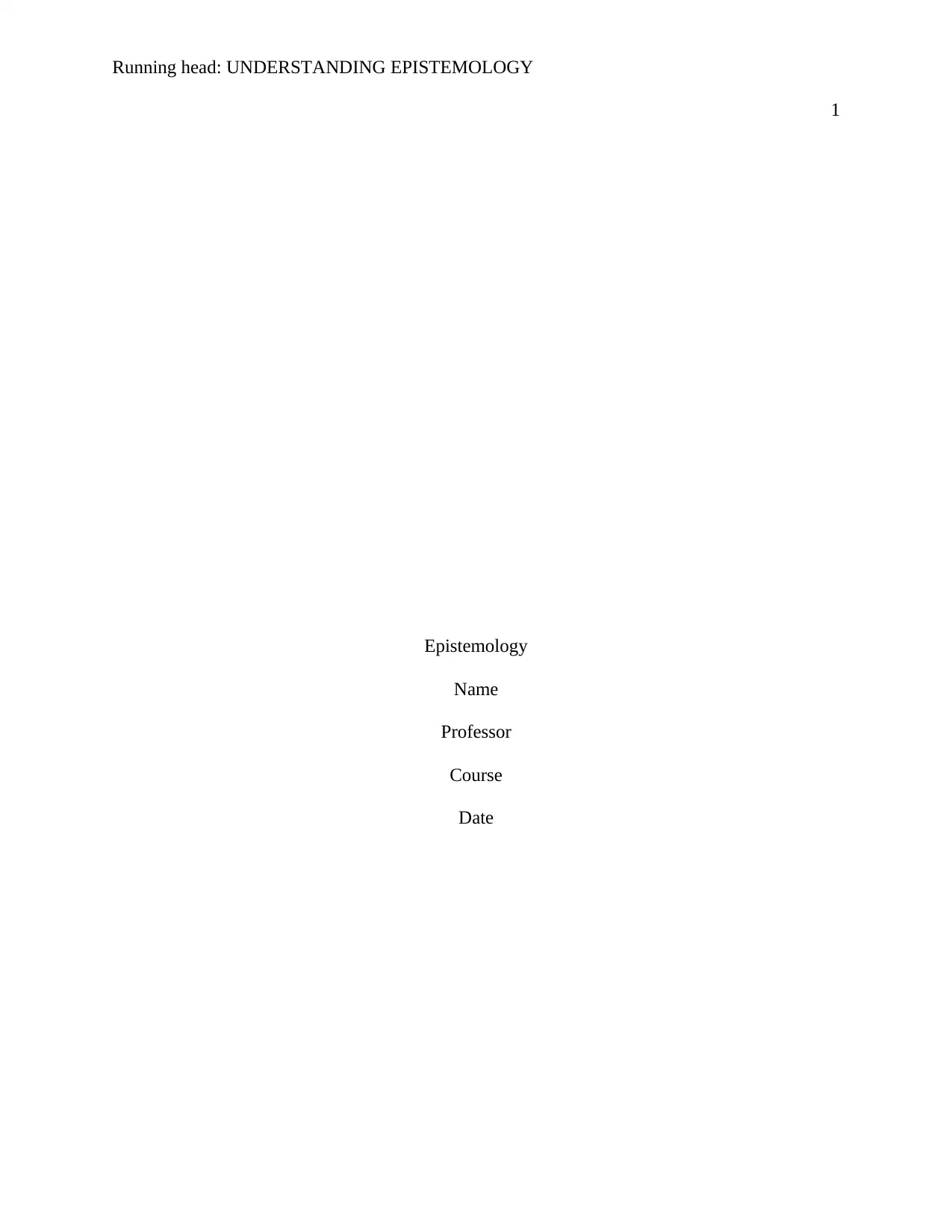
Running head: UNDERSTANDING EPISTEMOLOGY
1
Epistemology
Name
Professor
Course
Date
1
Epistemology
Name
Professor
Course
Date
Paraphrase This Document
Need a fresh take? Get an instant paraphrase of this document with our AI Paraphraser
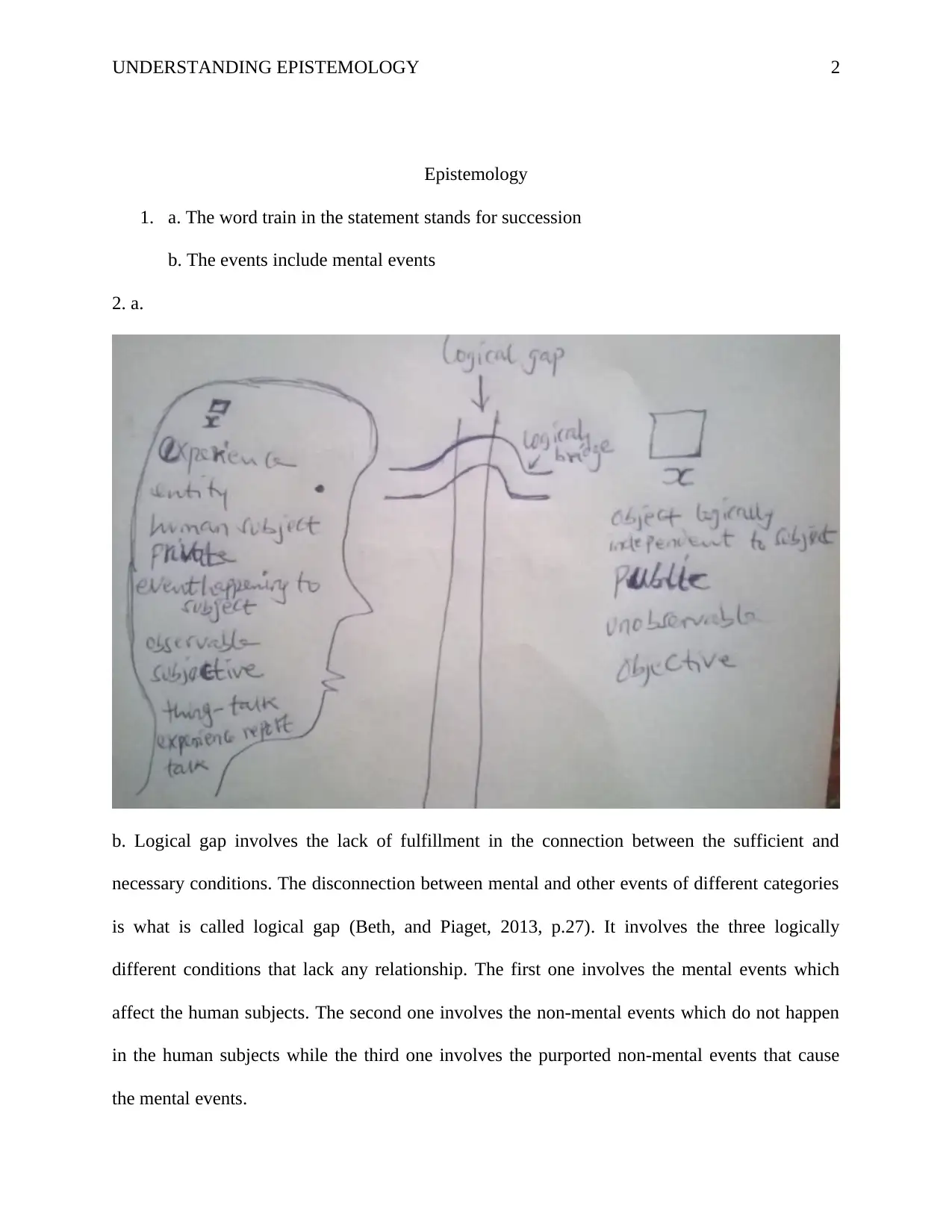
UNDERSTANDING EPISTEMOLOGY 2
Epistemology
1. a. The word train in the statement stands for succession
b. The events include mental events
2. a.
b. Logical gap involves the lack of fulfillment in the connection between the sufficient and
necessary conditions. The disconnection between mental and other events of different categories
is what is called logical gap (Beth, and Piaget, 2013, p.27). It involves the three logically
different conditions that lack any relationship. The first one involves the mental events which
affect the human subjects. The second one involves the non-mental events which do not happen
in the human subjects while the third one involves the purported non-mental events that cause
the mental events.
Epistemology
1. a. The word train in the statement stands for succession
b. The events include mental events
2. a.
b. Logical gap involves the lack of fulfillment in the connection between the sufficient and
necessary conditions. The disconnection between mental and other events of different categories
is what is called logical gap (Beth, and Piaget, 2013, p.27). It involves the three logically
different conditions that lack any relationship. The first one involves the mental events which
affect the human subjects. The second one involves the non-mental events which do not happen
in the human subjects while the third one involves the purported non-mental events that cause
the mental events.
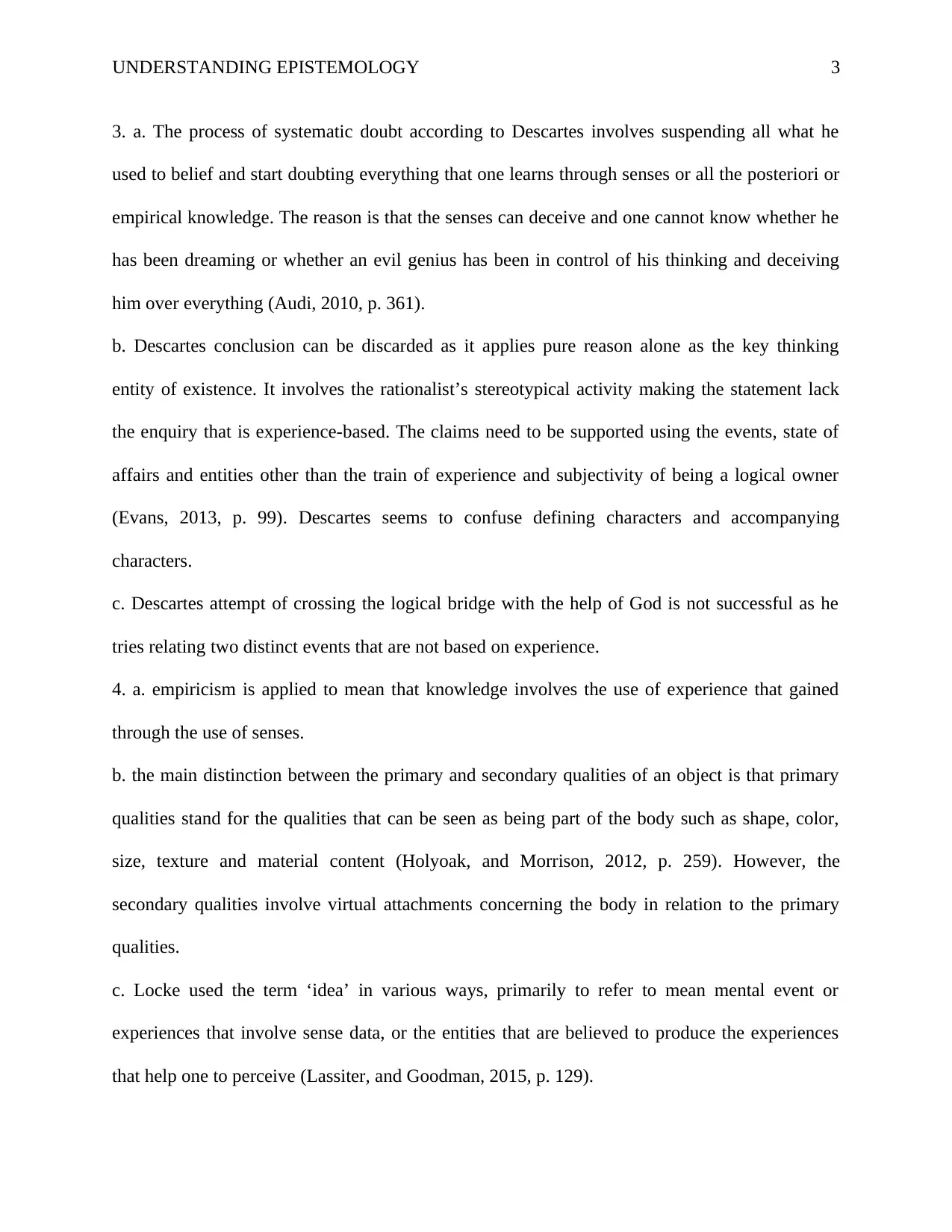
UNDERSTANDING EPISTEMOLOGY 3
3. a. The process of systematic doubt according to Descartes involves suspending all what he
used to belief and start doubting everything that one learns through senses or all the posteriori or
empirical knowledge. The reason is that the senses can deceive and one cannot know whether he
has been dreaming or whether an evil genius has been in control of his thinking and deceiving
him over everything (Audi, 2010, p. 361).
b. Descartes conclusion can be discarded as it applies pure reason alone as the key thinking
entity of existence. It involves the rationalist’s stereotypical activity making the statement lack
the enquiry that is experience-based. The claims need to be supported using the events, state of
affairs and entities other than the train of experience and subjectivity of being a logical owner
(Evans, 2013, p. 99). Descartes seems to confuse defining characters and accompanying
characters.
c. Descartes attempt of crossing the logical bridge with the help of God is not successful as he
tries relating two distinct events that are not based on experience.
4. a. empiricism is applied to mean that knowledge involves the use of experience that gained
through the use of senses.
b. the main distinction between the primary and secondary qualities of an object is that primary
qualities stand for the qualities that can be seen as being part of the body such as shape, color,
size, texture and material content (Holyoak, and Morrison, 2012, p. 259). However, the
secondary qualities involve virtual attachments concerning the body in relation to the primary
qualities.
c. Locke used the term ‘idea’ in various ways, primarily to refer to mean mental event or
experiences that involve sense data, or the entities that are believed to produce the experiences
that help one to perceive (Lassiter, and Goodman, 2015, p. 129).
3. a. The process of systematic doubt according to Descartes involves suspending all what he
used to belief and start doubting everything that one learns through senses or all the posteriori or
empirical knowledge. The reason is that the senses can deceive and one cannot know whether he
has been dreaming or whether an evil genius has been in control of his thinking and deceiving
him over everything (Audi, 2010, p. 361).
b. Descartes conclusion can be discarded as it applies pure reason alone as the key thinking
entity of existence. It involves the rationalist’s stereotypical activity making the statement lack
the enquiry that is experience-based. The claims need to be supported using the events, state of
affairs and entities other than the train of experience and subjectivity of being a logical owner
(Evans, 2013, p. 99). Descartes seems to confuse defining characters and accompanying
characters.
c. Descartes attempt of crossing the logical bridge with the help of God is not successful as he
tries relating two distinct events that are not based on experience.
4. a. empiricism is applied to mean that knowledge involves the use of experience that gained
through the use of senses.
b. the main distinction between the primary and secondary qualities of an object is that primary
qualities stand for the qualities that can be seen as being part of the body such as shape, color,
size, texture and material content (Holyoak, and Morrison, 2012, p. 259). However, the
secondary qualities involve virtual attachments concerning the body in relation to the primary
qualities.
c. Locke used the term ‘idea’ in various ways, primarily to refer to mean mental event or
experiences that involve sense data, or the entities that are believed to produce the experiences
that help one to perceive (Lassiter, and Goodman, 2015, p. 129).
⊘ This is a preview!⊘
Do you want full access?
Subscribe today to unlock all pages.

Trusted by 1+ million students worldwide
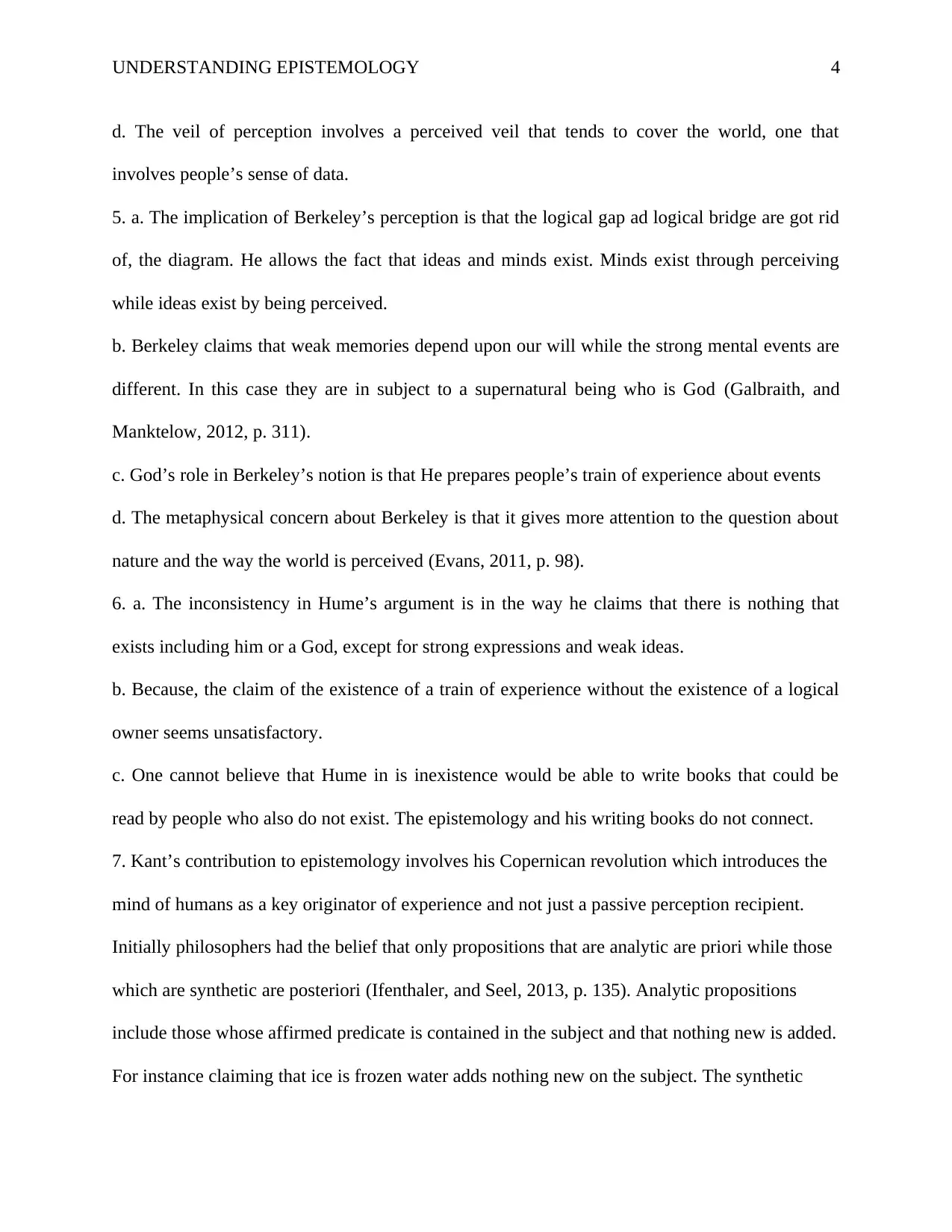
UNDERSTANDING EPISTEMOLOGY 4
d. The veil of perception involves a perceived veil that tends to cover the world, one that
involves people’s sense of data.
5. a. The implication of Berkeley’s perception is that the logical gap ad logical bridge are got rid
of, the diagram. He allows the fact that ideas and minds exist. Minds exist through perceiving
while ideas exist by being perceived.
b. Berkeley claims that weak memories depend upon our will while the strong mental events are
different. In this case they are in subject to a supernatural being who is God (Galbraith, and
Manktelow, 2012, p. 311).
c. God’s role in Berkeley’s notion is that He prepares people’s train of experience about events
d. The metaphysical concern about Berkeley is that it gives more attention to the question about
nature and the way the world is perceived (Evans, 2011, p. 98).
6. a. The inconsistency in Hume’s argument is in the way he claims that there is nothing that
exists including him or a God, except for strong expressions and weak ideas.
b. Because, the claim of the existence of a train of experience without the existence of a logical
owner seems unsatisfactory.
c. One cannot believe that Hume in is inexistence would be able to write books that could be
read by people who also do not exist. The epistemology and his writing books do not connect.
7. Kant’s contribution to epistemology involves his Copernican revolution which introduces the
mind of humans as a key originator of experience and not just a passive perception recipient.
Initially philosophers had the belief that only propositions that are analytic are priori while those
which are synthetic are posteriori (Ifenthaler, and Seel, 2013, p. 135). Analytic propositions
include those whose affirmed predicate is contained in the subject and that nothing new is added.
For instance claiming that ice is frozen water adds nothing new on the subject. The synthetic
d. The veil of perception involves a perceived veil that tends to cover the world, one that
involves people’s sense of data.
5. a. The implication of Berkeley’s perception is that the logical gap ad logical bridge are got rid
of, the diagram. He allows the fact that ideas and minds exist. Minds exist through perceiving
while ideas exist by being perceived.
b. Berkeley claims that weak memories depend upon our will while the strong mental events are
different. In this case they are in subject to a supernatural being who is God (Galbraith, and
Manktelow, 2012, p. 311).
c. God’s role in Berkeley’s notion is that He prepares people’s train of experience about events
d. The metaphysical concern about Berkeley is that it gives more attention to the question about
nature and the way the world is perceived (Evans, 2011, p. 98).
6. a. The inconsistency in Hume’s argument is in the way he claims that there is nothing that
exists including him or a God, except for strong expressions and weak ideas.
b. Because, the claim of the existence of a train of experience without the existence of a logical
owner seems unsatisfactory.
c. One cannot believe that Hume in is inexistence would be able to write books that could be
read by people who also do not exist. The epistemology and his writing books do not connect.
7. Kant’s contribution to epistemology involves his Copernican revolution which introduces the
mind of humans as a key originator of experience and not just a passive perception recipient.
Initially philosophers had the belief that only propositions that are analytic are priori while those
which are synthetic are posteriori (Ifenthaler, and Seel, 2013, p. 135). Analytic propositions
include those whose affirmed predicate is contained in the subject and that nothing new is added.
For instance claiming that ice is frozen water adds nothing new on the subject. The synthetic
Paraphrase This Document
Need a fresh take? Get an instant paraphrase of this document with our AI Paraphraser
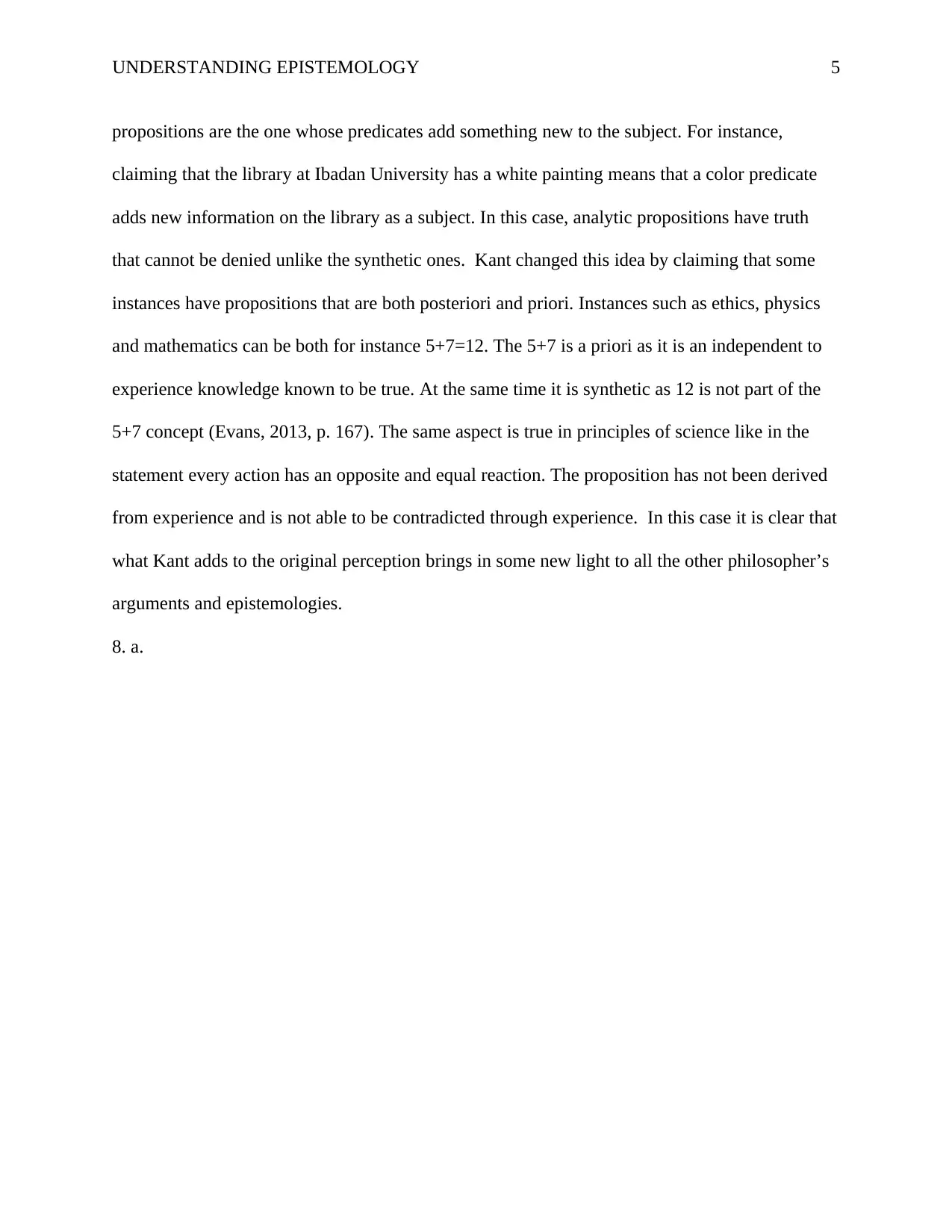
UNDERSTANDING EPISTEMOLOGY 5
propositions are the one whose predicates add something new to the subject. For instance,
claiming that the library at Ibadan University has a white painting means that a color predicate
adds new information on the library as a subject. In this case, analytic propositions have truth
that cannot be denied unlike the synthetic ones. Kant changed this idea by claiming that some
instances have propositions that are both posteriori and priori. Instances such as ethics, physics
and mathematics can be both for instance 5+7=12. The 5+7 is a priori as it is an independent to
experience knowledge known to be true. At the same time it is synthetic as 12 is not part of the
5+7 concept (Evans, 2013, p. 167). The same aspect is true in principles of science like in the
statement every action has an opposite and equal reaction. The proposition has not been derived
from experience and is not able to be contradicted through experience. In this case it is clear that
what Kant adds to the original perception brings in some new light to all the other philosopher’s
arguments and epistemologies.
8. a.
propositions are the one whose predicates add something new to the subject. For instance,
claiming that the library at Ibadan University has a white painting means that a color predicate
adds new information on the library as a subject. In this case, analytic propositions have truth
that cannot be denied unlike the synthetic ones. Kant changed this idea by claiming that some
instances have propositions that are both posteriori and priori. Instances such as ethics, physics
and mathematics can be both for instance 5+7=12. The 5+7 is a priori as it is an independent to
experience knowledge known to be true. At the same time it is synthetic as 12 is not part of the
5+7 concept (Evans, 2013, p. 167). The same aspect is true in principles of science like in the
statement every action has an opposite and equal reaction. The proposition has not been derived
from experience and is not able to be contradicted through experience. In this case it is clear that
what Kant adds to the original perception brings in some new light to all the other philosopher’s
arguments and epistemologies.
8. a.
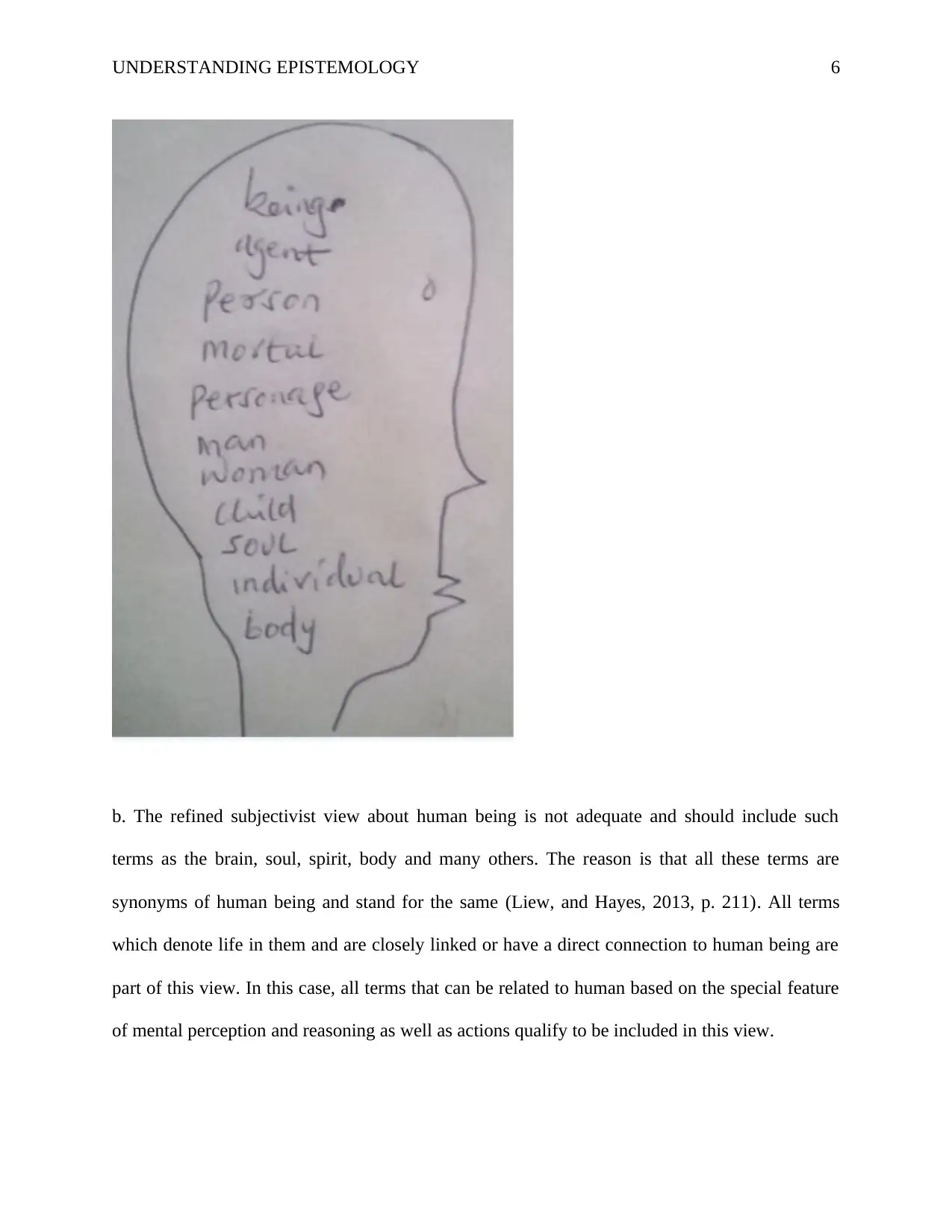
UNDERSTANDING EPISTEMOLOGY 6
b. The refined subjectivist view about human being is not adequate and should include such
terms as the brain, soul, spirit, body and many others. The reason is that all these terms are
synonyms of human being and stand for the same (Liew, and Hayes, 2013, p. 211). All terms
which denote life in them and are closely linked or have a direct connection to human being are
part of this view. In this case, all terms that can be related to human based on the special feature
of mental perception and reasoning as well as actions qualify to be included in this view.
b. The refined subjectivist view about human being is not adequate and should include such
terms as the brain, soul, spirit, body and many others. The reason is that all these terms are
synonyms of human being and stand for the same (Liew, and Hayes, 2013, p. 211). All terms
which denote life in them and are closely linked or have a direct connection to human being are
part of this view. In this case, all terms that can be related to human based on the special feature
of mental perception and reasoning as well as actions qualify to be included in this view.
⊘ This is a preview!⊘
Do you want full access?
Subscribe today to unlock all pages.

Trusted by 1+ million students worldwide
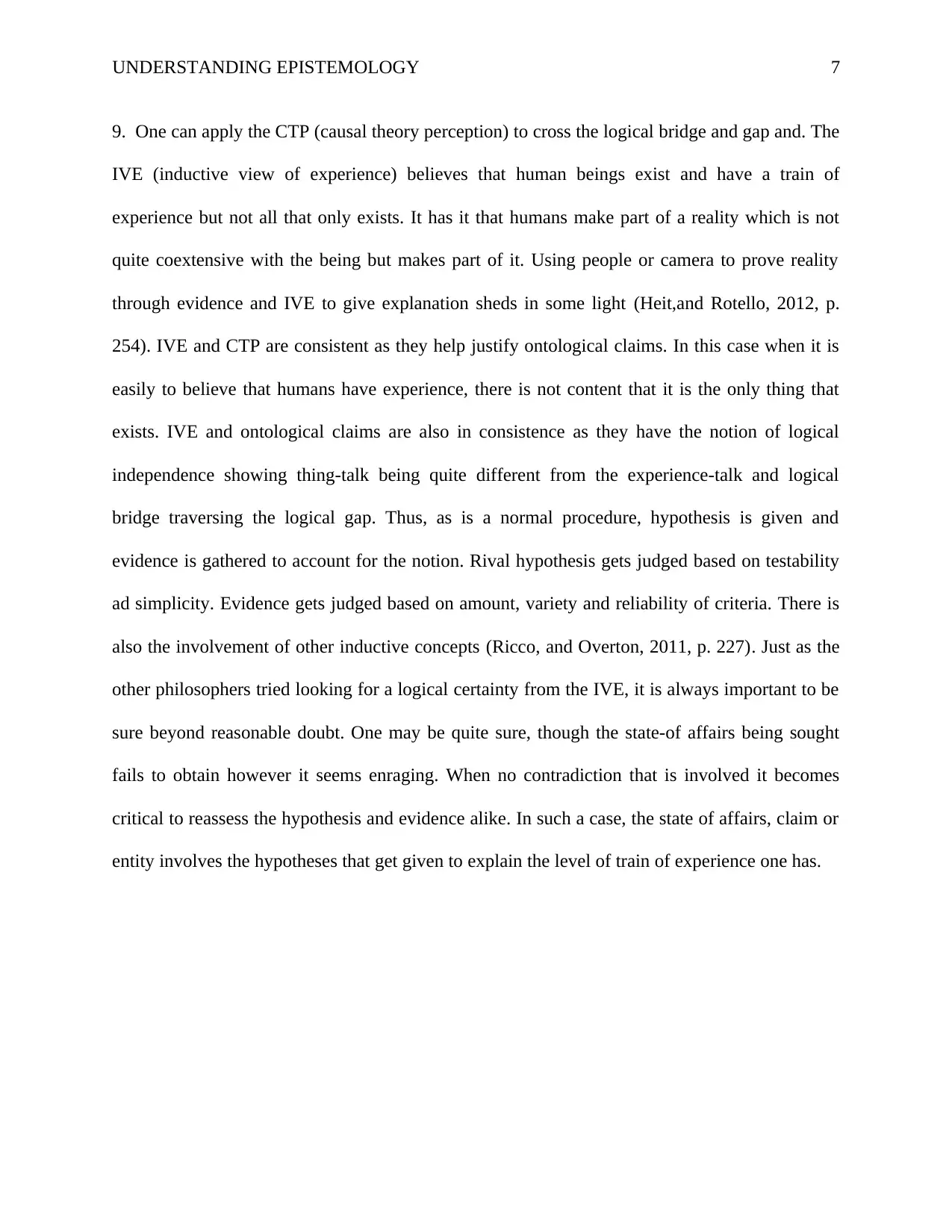
UNDERSTANDING EPISTEMOLOGY 7
9. One can apply the CTP (causal theory perception) to cross the logical bridge and gap and. The
IVE (inductive view of experience) believes that human beings exist and have a train of
experience but not all that only exists. It has it that humans make part of a reality which is not
quite coextensive with the being but makes part of it. Using people or camera to prove reality
through evidence and IVE to give explanation sheds in some light (Heit,and Rotello, 2012, p.
254). IVE and CTP are consistent as they help justify ontological claims. In this case when it is
easily to believe that humans have experience, there is not content that it is the only thing that
exists. IVE and ontological claims are also in consistence as they have the notion of logical
independence showing thing-talk being quite different from the experience-talk and logical
bridge traversing the logical gap. Thus, as is a normal procedure, hypothesis is given and
evidence is gathered to account for the notion. Rival hypothesis gets judged based on testability
ad simplicity. Evidence gets judged based on amount, variety and reliability of criteria. There is
also the involvement of other inductive concepts (Ricco, and Overton, 2011, p. 227). Just as the
other philosophers tried looking for a logical certainty from the IVE, it is always important to be
sure beyond reasonable doubt. One may be quite sure, though the state-of affairs being sought
fails to obtain however it seems enraging. When no contradiction that is involved it becomes
critical to reassess the hypothesis and evidence alike. In such a case, the state of affairs, claim or
entity involves the hypotheses that get given to explain the level of train of experience one has.
9. One can apply the CTP (causal theory perception) to cross the logical bridge and gap and. The
IVE (inductive view of experience) believes that human beings exist and have a train of
experience but not all that only exists. It has it that humans make part of a reality which is not
quite coextensive with the being but makes part of it. Using people or camera to prove reality
through evidence and IVE to give explanation sheds in some light (Heit,and Rotello, 2012, p.
254). IVE and CTP are consistent as they help justify ontological claims. In this case when it is
easily to believe that humans have experience, there is not content that it is the only thing that
exists. IVE and ontological claims are also in consistence as they have the notion of logical
independence showing thing-talk being quite different from the experience-talk and logical
bridge traversing the logical gap. Thus, as is a normal procedure, hypothesis is given and
evidence is gathered to account for the notion. Rival hypothesis gets judged based on testability
ad simplicity. Evidence gets judged based on amount, variety and reliability of criteria. There is
also the involvement of other inductive concepts (Ricco, and Overton, 2011, p. 227). Just as the
other philosophers tried looking for a logical certainty from the IVE, it is always important to be
sure beyond reasonable doubt. One may be quite sure, though the state-of affairs being sought
fails to obtain however it seems enraging. When no contradiction that is involved it becomes
critical to reassess the hypothesis and evidence alike. In such a case, the state of affairs, claim or
entity involves the hypotheses that get given to explain the level of train of experience one has.
Paraphrase This Document
Need a fresh take? Get an instant paraphrase of this document with our AI Paraphraser
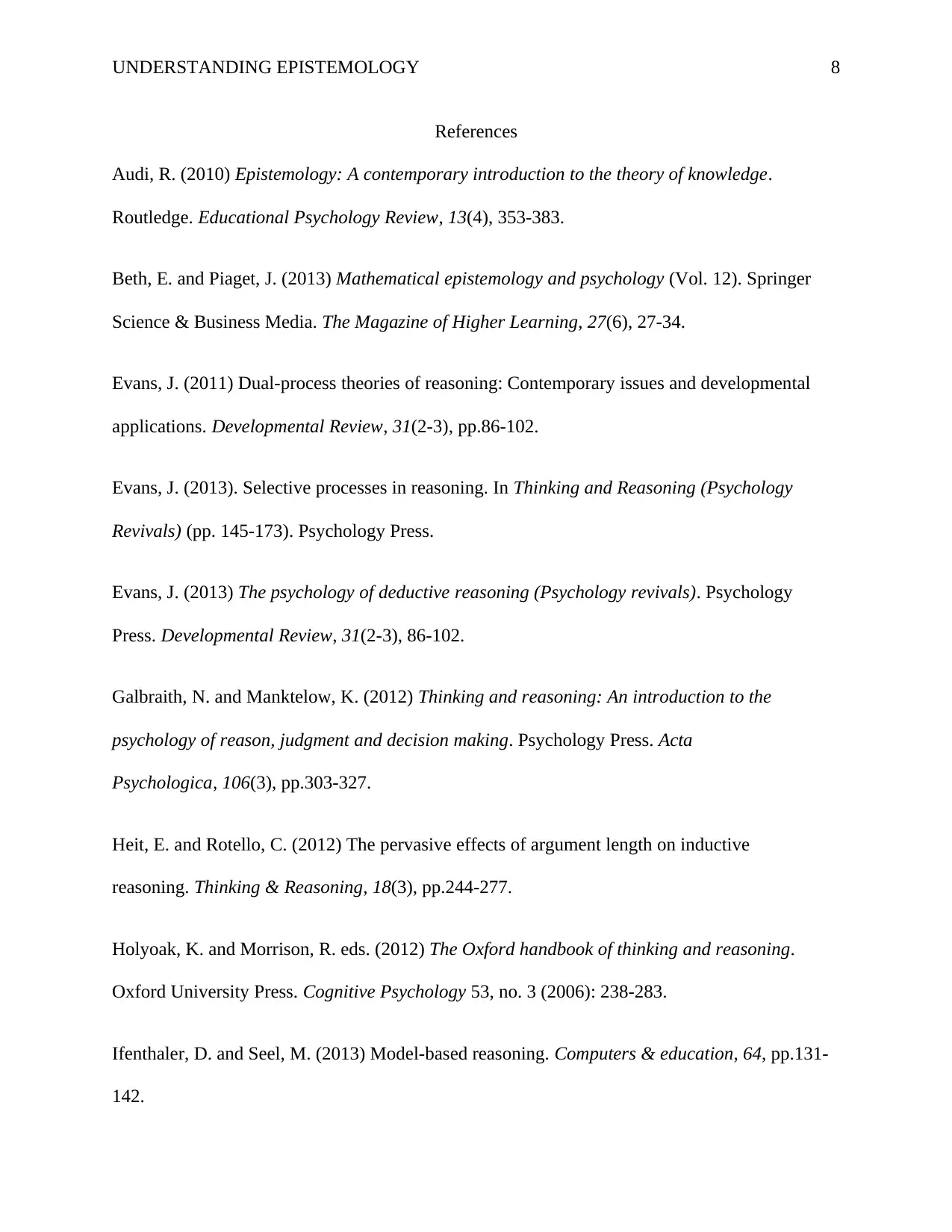
UNDERSTANDING EPISTEMOLOGY 8
References
Audi, R. (2010) Epistemology: A contemporary introduction to the theory of knowledge.
Routledge. Educational Psychology Review, 13(4), 353-383.
Beth, E. and Piaget, J. (2013) Mathematical epistemology and psychology (Vol. 12). Springer
Science & Business Media. The Magazine of Higher Learning, 27(6), 27-34.
Evans, J. (2011) Dual-process theories of reasoning: Contemporary issues and developmental
applications. Developmental Review, 31(2-3), pp.86-102.
Evans, J. (2013). Selective processes in reasoning. In Thinking and Reasoning (Psychology
Revivals) (pp. 145-173). Psychology Press.
Evans, J. (2013) The psychology of deductive reasoning (Psychology revivals). Psychology
Press. Developmental Review, 31(2-3), 86-102.
Galbraith, N. and Manktelow, K. (2012) Thinking and reasoning: An introduction to the
psychology of reason, judgment and decision making. Psychology Press. Acta
Psychologica, 106(3), pp.303-327.
Heit, E. and Rotello, C. (2012) The pervasive effects of argument length on inductive
reasoning. Thinking & Reasoning, 18(3), pp.244-277.
Holyoak, K. and Morrison, R. eds. (2012) The Oxford handbook of thinking and reasoning.
Oxford University Press. Cognitive Psychology 53, no. 3 (2006): 238-283.
Ifenthaler, D. and Seel, M. (2013) Model-based reasoning. Computers & education, 64, pp.131-
142.
References
Audi, R. (2010) Epistemology: A contemporary introduction to the theory of knowledge.
Routledge. Educational Psychology Review, 13(4), 353-383.
Beth, E. and Piaget, J. (2013) Mathematical epistemology and psychology (Vol. 12). Springer
Science & Business Media. The Magazine of Higher Learning, 27(6), 27-34.
Evans, J. (2011) Dual-process theories of reasoning: Contemporary issues and developmental
applications. Developmental Review, 31(2-3), pp.86-102.
Evans, J. (2013). Selective processes in reasoning. In Thinking and Reasoning (Psychology
Revivals) (pp. 145-173). Psychology Press.
Evans, J. (2013) The psychology of deductive reasoning (Psychology revivals). Psychology
Press. Developmental Review, 31(2-3), 86-102.
Galbraith, N. and Manktelow, K. (2012) Thinking and reasoning: An introduction to the
psychology of reason, judgment and decision making. Psychology Press. Acta
Psychologica, 106(3), pp.303-327.
Heit, E. and Rotello, C. (2012) The pervasive effects of argument length on inductive
reasoning. Thinking & Reasoning, 18(3), pp.244-277.
Holyoak, K. and Morrison, R. eds. (2012) The Oxford handbook of thinking and reasoning.
Oxford University Press. Cognitive Psychology 53, no. 3 (2006): 238-283.
Ifenthaler, D. and Seel, M. (2013) Model-based reasoning. Computers & education, 64, pp.131-
142.
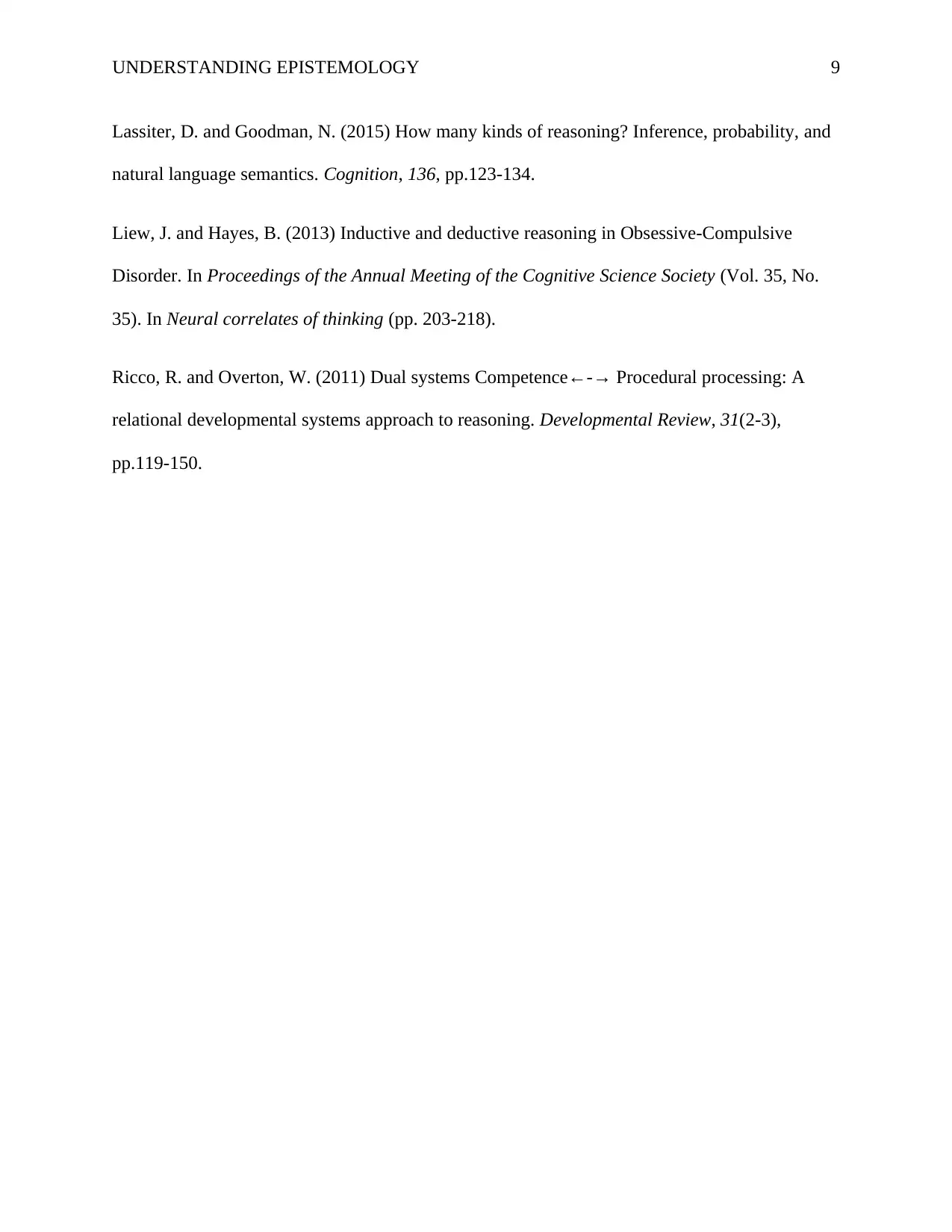
UNDERSTANDING EPISTEMOLOGY 9
Lassiter, D. and Goodman, N. (2015) How many kinds of reasoning? Inference, probability, and
natural language semantics. Cognition, 136, pp.123-134.
Liew, J. and Hayes, B. (2013) Inductive and deductive reasoning in Obsessive-Compulsive
Disorder. In Proceedings of the Annual Meeting of the Cognitive Science Society (Vol. 35, No.
35). In Neural correlates of thinking (pp. 203-218).
Ricco, R. and Overton, W. (2011) Dual systems Competence←-→ Procedural processing: A
relational developmental systems approach to reasoning. Developmental Review, 31(2-3),
pp.119-150.
Lassiter, D. and Goodman, N. (2015) How many kinds of reasoning? Inference, probability, and
natural language semantics. Cognition, 136, pp.123-134.
Liew, J. and Hayes, B. (2013) Inductive and deductive reasoning in Obsessive-Compulsive
Disorder. In Proceedings of the Annual Meeting of the Cognitive Science Society (Vol. 35, No.
35). In Neural correlates of thinking (pp. 203-218).
Ricco, R. and Overton, W. (2011) Dual systems Competence←-→ Procedural processing: A
relational developmental systems approach to reasoning. Developmental Review, 31(2-3),
pp.119-150.
⊘ This is a preview!⊘
Do you want full access?
Subscribe today to unlock all pages.

Trusted by 1+ million students worldwide
1 out of 9
Your All-in-One AI-Powered Toolkit for Academic Success.
+13062052269
info@desklib.com
Available 24*7 on WhatsApp / Email
![[object Object]](/_next/static/media/star-bottom.7253800d.svg)
Unlock your academic potential
Copyright © 2020–2026 A2Z Services. All Rights Reserved. Developed and managed by ZUCOL.